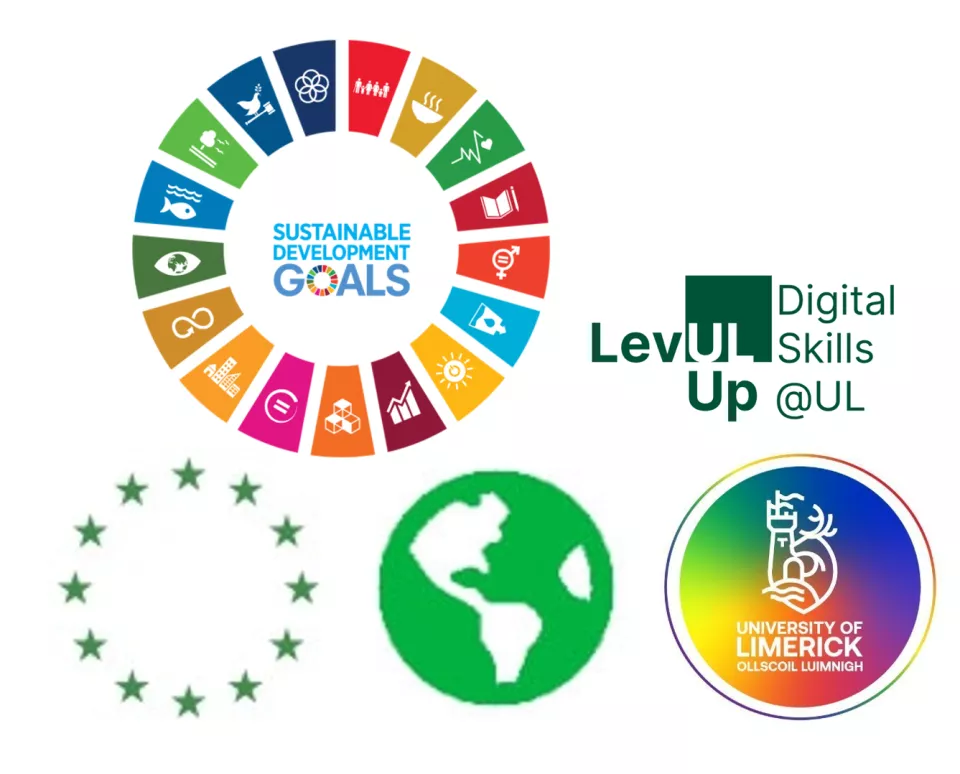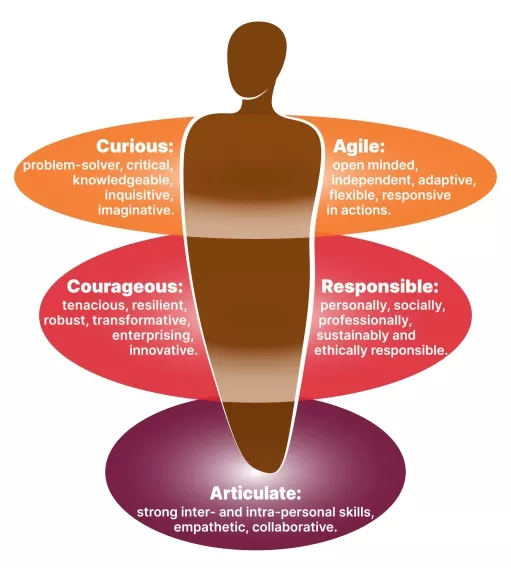You and your programme team will define what these attributes will look like for graduates of your programme
The articulate graduate is empathetic and collaborative, with strong inter- and intra-personal skills
This may be achieved via a range of different assessments, that push the learners to think about their discipline from multiple perspectives:
- ask students to use different media and different formats to articulate their understanding
- include professional or discipline-specific needs of graduates in assessments
- scaffold group work and collaboration
- build in multidisciplinarity where possible.
The agile graduate is open minded, independent, adaptive, flexible, responsive in actions
Agility can be promoted via innovative learning and teaching practices. Flexible, transformative learning and teaching that is challenge-led and has a focus on active learning, such as:
- problem/project-based learning,
- case-studies, real-world examples,
- co-operative learning experiences,
- authentic assessments.
The courageous graduate is tenacious, resilient, robust, transformative, enterprising, innovative.
Courageous graduates can be nurtured by
- presenting challenges that require creative solutions,
- authentic learning experiences.
The curious graduate is a problem-solver, critical, knowledgeable, inquisitive, imaginative
This curiosity can be built by:
- supporting self-directed learning,
- emphasising the importance of independent research
- creating opportunities for finding problem-based and challenge-driven solutions
The responsible graduate shows this by being personally, socially, professionally, sustainably and ethically responsible
We can build a learning environment that scaffolds an ethical and social world-view, that creates graduates who take responsibility for their own actions, and for the direction of the discipline in which they work.
How we embed Graduate Attributes in our curricula
To support our students to become outstanding active and globally engaged citizens, we need to:
-
define our Graduate Attribute goals at Programme level
-
create a ripple effect throughout the Programme modules
This could involve incorporating UN SDGs, Digital Skill development, Internationalisation, and EDI considerations.

Suggested first steps to embedding Graduate Attributes into the curriculum
This interactive checklist containing these initial questions will be a helpful tool to discuss these matters with your programme team.
Map graduate attributes to the curriculum
- Are the Graduate Attributes reflected in the Programme Learning Outcomes?
- Have you offered students activities to develop these attributes across this programme?
- Do students have opportunities to demonstrate this attainment in their assessments in this programme?
- Do the learning and teaching approaches adopted in the Learning Environment allow students to develop these Graduate Attributes?
Embed the graduate attributes across the programme
- Have you defined what these attributes look like for graduates of your programme?
- Have you identified opportunities across the students' learning pathways (modules) for students to develop these attributes?
- Have you considered capstone experiences for students to develop and evidence attainment of these Graduate Attributes throughout the programme?
These core learning outcomes of a university education are developed across a number of years throughout the student learning journey
(Hughes and Barrie 2010, 330)

We can:
- contextualise the Graduate Attributes to our specific discipline
- think about the Graduate Attributes as we write our Programme Learning Outcomes
- design Learning Environments which enable the achievement of those outcomes
- implement these outcomes across the curriculum as a Programme Team, working them into:
- Module Learning Outcomes;
- any planned learning activities;
- all assessments, summative or formative.
- Have you identified the digital skills and literacies needed by graduates in your discipline/profession or curricular context?
- Have you decided where you can embed opportunities to develop these literacies across your programme?
- Do you use digital technologies that are supported by resources within the university?
- Have you provided opportunities for internationalisation, via, for example:
- co-op placements;
- Internationalisation at Home (IaH) initiatives;
- Virtual Exchange projects
- Have you built in opportunities for students to participate in EDI initiatives?
- Have you included an awareness of social justice and opportunities for students to work towards social good?
- Have you built in processes to facilitate multidisciplinarity in the curriculum?
- Are there 'wicked problems' (complex social or cultural problems that are challenging and difficult to resolve) your students could tackle?
- Have you considered developing a capstone experience to allow students to bring their learning together in creative ways to explore real-world problems?
- Have you considered using portfolio development, to allow students to gather evidence of the attainment of Graduate Attributes for future employers, etc.?
- Have you included opportunities for students to reflect on their development?
- Have you included opportunities for students to identify potential areas for future development?
- Do you plan to encourage students' self-assessment of learning outcomes?
- Do students have opportunities to show their engagement in extra-curricular activities?
- Is it clear to students that such engagement can have an impact on their attainment of the Graduate Attributes?
This interactive checklist contains all of these questions for discussing with your programme team.
References
Bowden, J., Hart, G., King, B., Trigwell, K. and Watts, O. 2000. Generic capabilities of ATN university graduates
Hughes, C. and Barrie, S. (2010) Influences on the assessment of graduate attributes in higher education, Assessment & Evaluation in Higher Education, 35 (3), 325–334.
Please contact us at curriculumdevelopment@ul.ie for further information or to request assistance.
Return to the ICDF page | Return to the UL Graduate page | Read more about Embedding the Graduate Attributes
